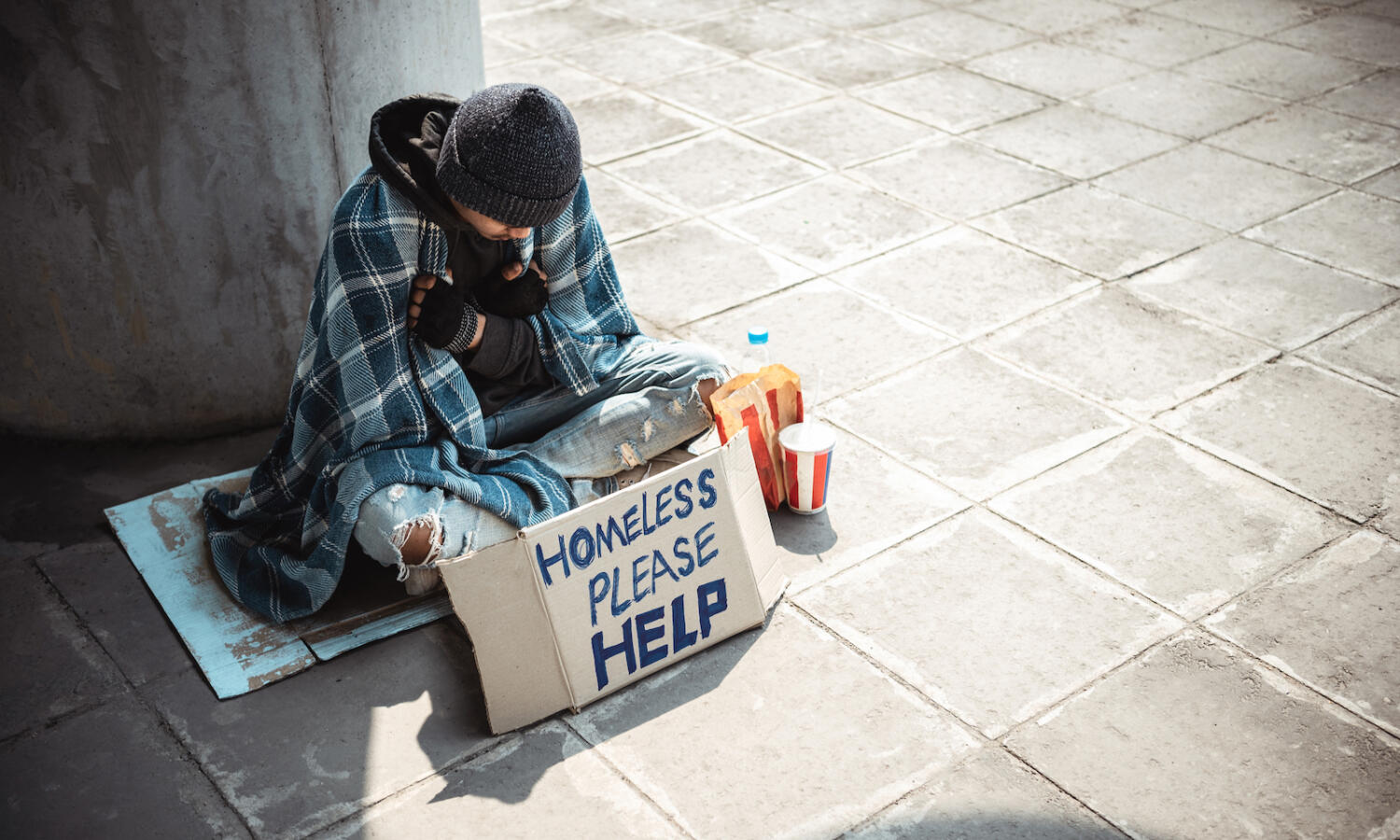Growing up, the Purim mitzvah of matanot l’evyonim, or giving gifts to the poor, meant putting cash in a plate at the synagogue when we went to hear the megillah. This wonderful practice is still alive and well in many communities, and often quite sizable collections of cash and canned goods go directly each Purim to local food pantries, shelters and other organizations serving the poor.
This is an excellent (and Maimonides-preferred) approach. But in recent years, I’ve also done something else — namely, taking gifts, cash, good cheer and my listening ears down to the neighborhoods where homeless folks hang out.
Homelessness is a massive problem, and it’s only worsening. The proliferation of tent cities on the American landscape reflects a complicated mix of factors, including insufficient affordable housing, falling real wages, general failures in social care, intergenerational trauma, legalized discrimination, systemic racism and more. As a rabbi, it is homelessness, more often than any single other issue, that members of the Jewish community — adults, teens and children — tell me they want to address.
At our core, we know it is very wrong to allow other human beings to go unhoused. It is an affront to our shared humanity, and we are often only half-aware of the moral injury it does to us who are complicit in this degradation. But it’s not easy to stand with and for the powerless. Homeless people have very few rights. They are almost inevitably non-voters, and are widely pathologized in the collective consciousness as a sort of under-caste, a shadow projection of what our society least wants to be.

Help us keep Jewish knowledge accessible to millions of people around the world.
Your donation to My Jewish Learning fuels endless journeys of Jewish discovery. With your help, My Jewish Learning can continue to provide nonstop opportunities for learning, connection and growth.
As in many places, in the supposedly liberal town where I live police are mandated to destroy the property of people sleeping rough. And despite the familiar fundamental directive to love one’s neighbor as oneself, in practice many people resist those experiencing homelessness becoming their neighbors, whether out in the open or under a roof.
Judaism categorically requires us to provide for the poor and the destitute, recognizing that “the needy will never be gone from the land” (Deuteronomy 15:11) and that God most certainly cares about their lives. The Talmud is explicit about what this support must entail, including daily meals, living expenses, clothing and ultimately burial costs (Bava Batra 8a). Even temporary residents of a place are required to contribute to these funds, which are administered at the municipal level. The tradition is clear that after your own relatives, the needy of the place you live have first call on your charity. (Bava Metzia 71a)
The obligation to care for local people in need is accentuated on Purim, where the directive to give gifts to the poor is found in the same breath of Megillat Esther as feasting, merrymaking and sending treats to our friends (Esther 9:22). The Purim story, with its sharp twists of fortune, also reminds us that social status can get switched up more dramatically than we might expect, and that all of us, at whatever level of society we are operating, are playing parts in one collective cosmic drama.
Esther is also a story set in the shadow of exile, yet another iteration of our Jewish mythologizing of estrangement and collective homelessness. This is the story we tell of humanity too: expelled from paradise and condemned to wander the earth. The obsession with home and homelessness is one we even project onto God. While our ancient texts tell us that all material reality springs from God’s “desire to have a dwelling place in the denser dimensions” (Midrash Tanchuma Naso 16), the rabbis also teach that God’s presence, the shekhinah, remains in exile, wandering in the world hovering a foot from the ground, not ever quite able to rest.
It is in this Hebrew month of Adar that the paradox of God’s apparent presence in apparent exile is most confronted. The kabbalists tell us to read the name of this month as aleph dar: Aleph (God) is in residence. The Torah portions read this month are largely concerned with building a mishkan, a living space for God. Meanwhile, the scroll of Esther is famous for being the only book in the Bible in which God is not mentioned. Even the name Esther hints at this — translated as “I shall obscure,” it directly references God’s self-concealment.
Visiting with those in dire need on Purim, God was never more present — nor more absent. One man I met, who lacked the funds to get back to Texas and his four children, had created a little fire from an aluminum cup and some hand sanitizer to help another, whose frostbitten feet were giving him terrible pain. Nearby, a group of volunteers was setting up a weekly free lunch station. But before your heart feels too warmed by this scene, let me also tell you that when the man with the bright eyes and frostbitten feet pulled off his sock to put on the new ones he’d just received, the first two toes of his left foot were entirely black with gangrene.
Why does God conceal Godself? Some say it’s for the pleasure of being found. And where can God always be discovered? In the mikdash me’at, the miniature sanctuary that each human being in this world embodies, the residing place for God.
This article initially appeared in My Jewish Learning’s Shabbat newsletter Recharge on Mar. 18, 2023. To sign up to receive Recharge each week in your inbox, click here.



